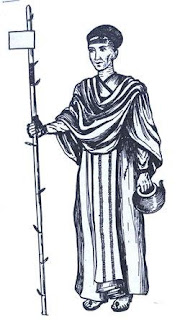 Today marks the death of Roberto de Nobili (1577-1656), an Italian Jesuit who spent more than fifty years as a missionary in India. Unlike most missionaries, de Nobili didn’t attempt to impose his own culture on the people he encountered. Instead, he studied theirs and attempted to reach them through it. He started to dress like a Brahmin, the leading figures in Hindu society, and adopted their ways in order to exercise the greatest influence on the largest number of people. He also studied the native languages. Eventually he was able to write books in Telegu, Tamil and Sanskrit (which he was the first European to master). He was a success, but not without opposition. Some church leaders felt he was too accommodating in his approach, but he argued that he was simply doing what the early Christians did: using whatever was not directly contrary to the Gospel in the interests of the Church. “If India is today in some degree Christian,” one Indian priest has said, “it is because of the Jesuits.”
Today marks the death of Roberto de Nobili (1577-1656), an Italian Jesuit who spent more than fifty years as a missionary in India. Unlike most missionaries, de Nobili didn’t attempt to impose his own culture on the people he encountered. Instead, he studied theirs and attempted to reach them through it. He started to dress like a Brahmin, the leading figures in Hindu society, and adopted their ways in order to exercise the greatest influence on the largest number of people. He also studied the native languages. Eventually he was able to write books in Telegu, Tamil and Sanskrit (which he was the first European to master). He was a success, but not without opposition. Some church leaders felt he was too accommodating in his approach, but he argued that he was simply doing what the early Christians did: using whatever was not directly contrary to the Gospel in the interests of the Church. “If India is today in some degree Christian,” one Indian priest has said, “it is because of the Jesuits.”











